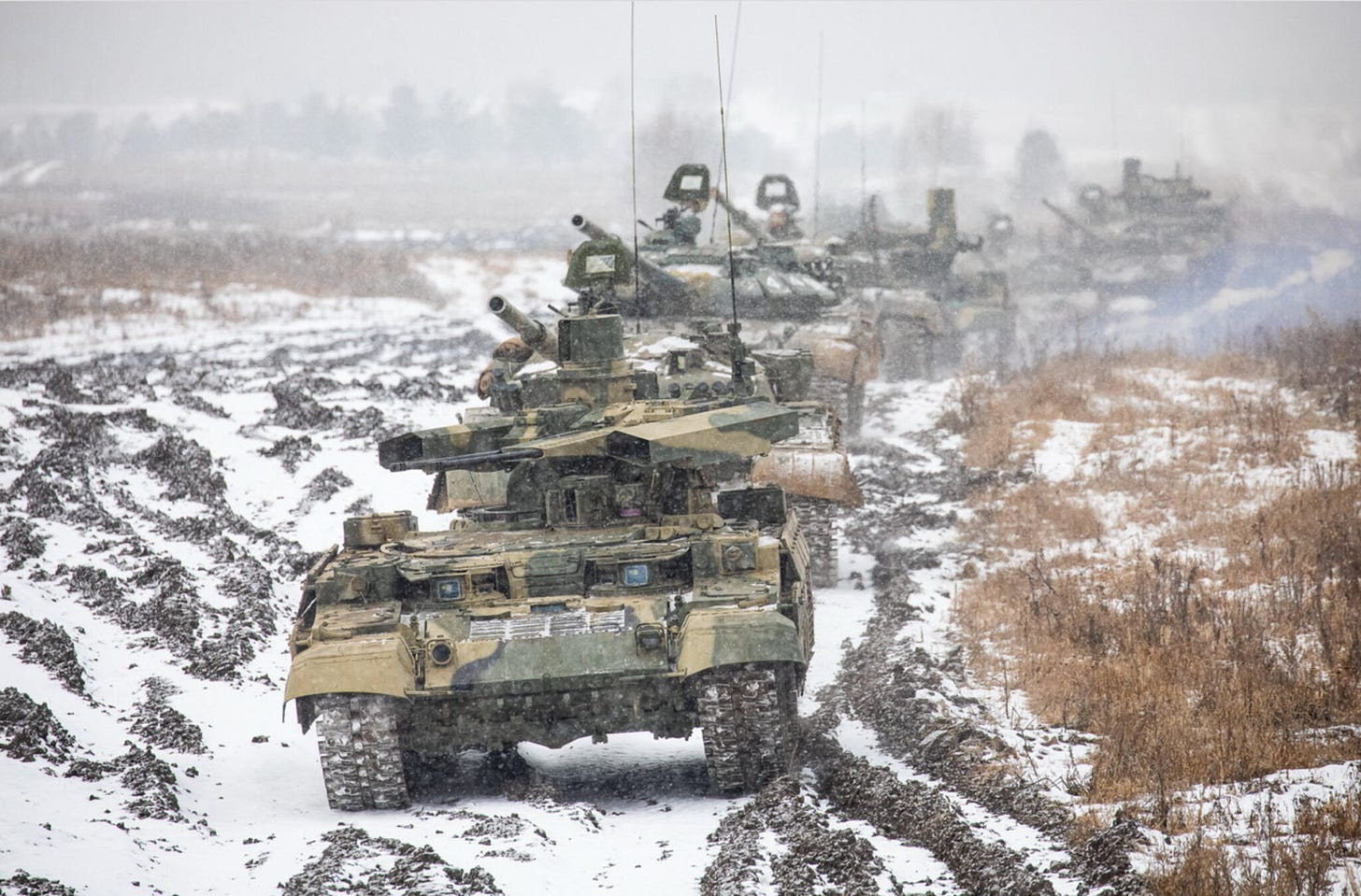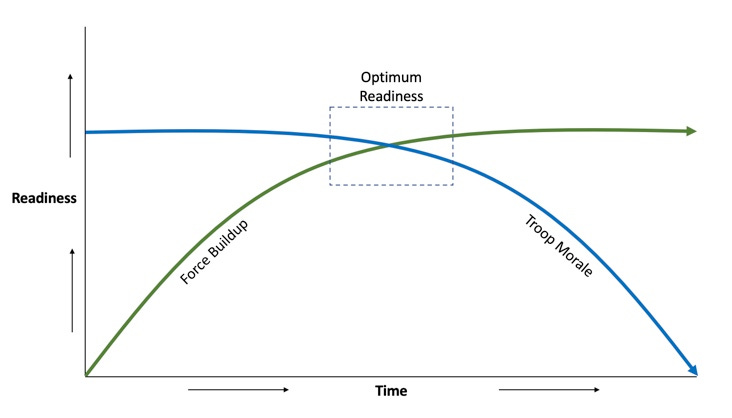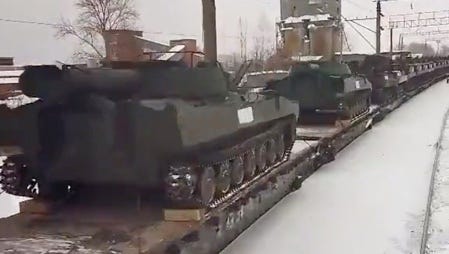Putin - Will he or won't he?
There is a point in time when, as a commander, you have deployed the force you need and the morale of your troops is still high. However, as time progresses, if you do not act, moral will degrade.
Those of you reading this who’ve crewed a main battle tank in the snow, as I have, in temperatures below zero, will know the hardship of doing so. You are constantly cold, cannot wash properly, and every task, from going to the toilet and eating, to operating and maintain an unforgivingly solid, industrially heavy, yet highly technical fighting vehicle, is made ten times harder than in a normal environment. It is not something you can do for months without end, and some of the Russian troops deployed to Ukraine’s borders in such conditions, have been there many weeks.
Yet, if Putin’s intentions are indeed to invade part, or all of Ukraine, it takes time to build the concentration of force necessary, time during which troops already deployed are already in hardship conditions.
My point is that there is a sweet spot… a point in time when, as a commander, you have deployed the forces you need, and the morale of your troops is still high. However, as time progresses, if you do not act, even though your forces are in position, your soldiers will tire of being in the field, in harsh conditions and away from family. They will be uncomfortable, idle, need occupying, will eventually become bored, fed up and increasingly critical. It is inevitable.
The military, political and diplomatic art is in creating maximum strategic hesitation, uncertainty and ambiguity for your opponent - in this case the Ukrainian government and NATO - and matching that moment with the sweet spot of military readiness.
Doing that is no simple matter and, of course, involves a raft of other lines of operation, including cyber warfare, leveraging energy supplies and economic influence, and applying the art of ‘maskirovka’ to the maximum.
Maskirovka (Russian for ‘little masquerade’) is the art of creating ambiguity and uncertainty in the operating environment, to enable freedom of action for achievement of Russia military & political objectives. In a word, it means deception, deception applied in all things political, diplomatic and military. It means ensuring you achieve political and military surprise, in terms of intention, time, place and method. The Russians are very good at maskirovka.
We’ve all heard that the Russian Ministry of Defence announced that some military units were “returning to their permanent locations”. Unfortunately, the UK media interpreted this as a withdrawal. However, let’s look at what is actually happening:
Two of the three units referred to by the Russian MoD, the 3rd and 150th Motor Rifle Divisions, which were in Crimea, are indeed returning to their permanent locations. But these permanent locations are on Ukraine’s norther and south-eastern borders respectively. No withdrawal there!
Even if some troops do leave, the fact is that there are at least 14 Battalion Tactical Groups moving, right now, towards the region, from deeper inside Russia, and the NATO Secretary General has said today that, far from seeing a withdraw, what we are seeing is an increase in the Russian military build-up.
Is this an example of maskirovka? Announcing that troops are going to be moving to permanent locations creates ambiguity and, therefore, hesitation on the part of Ukrainian and NATO decision makers who, if they observe Russian troop movements, will have to ask themselves. ‘is this the start of an offensive, or is it simply troops going home?" and crucial minutes or hours may be lost in determining the answer and in responding.
The point
Now, here is my overall point: The Kremlin has deployed its forces. There may be some adjustments to be made, but essentially, the air, land and sea assets are in place and ready to invade Ukraine. That is a fact. We can also safely assume that the deployed military personnel are ready and presently experiencing reasonably good morale. Putin has, militarily speaking, hit the point of maximum capability and readiness, and he has created a broad suite of military options. But, importantly, that ‘sweet spot’ window will gradually close as troop morale degrades with waiting. So, having reached that point, why is he not moving?
Well, it all depends on what Putin actually wants to achieve (I explain my thoughts on that in ‘Russia-Ukraine, the 11th Hour’, link below). But, outside that, my best guess - and it is a best guess, as I’m not inside Putin’s head - is that he and his commanders do not believe they’ve yet created sufficient ambiguity as to their intentions. He also knows that we know he is ready, and knows that Ukraine is also at a high state of readiness. It isn’t ideal to attack an adversary when the adversary is ready for you. But, remember, Ukrainian troops are likewise suffering hardship in the present weather conditions, and will in addition be experiencing the stress of anticipating a massive Russian onslaught. So, perhaps he is trying to undermine their nerves and moral by making them wait. We can only speculate.
Might he, at the end of the day, do nothing? Perhaps, butI doubt it. Let’s look at the benefits he’s gained v the ‘dis-benefits’.
Benefits:
He’s placed himself, Russia and Russian security concerns firmly at the centre of European affairs. He’s getting a great deal of attention and has a queue of world leaders lining up to visit and telephone him. Indeed, right now, he probably commands more attention than any other leader in the world. That in itself is important to him. Russia is important as long as he commands that attention, and his calculation is that the Russian people will support him as long as they feel the world is treating their nation with respect.
He’s succeeded in weakening the resolve of the western allies and may yet gain significant concessions on NATO, gas supplies to Europe and perhaps other things.
In this respect, the German Chancellor and the French President have already suggested giving in to his demand that NATO give a assurances that Ukraine will not join the alliance (To my mind, this is an extremely naive and dangerous attempt at appeasement in. Bear in mind that Putin has also demanded that NATO pull back from countries that joined since 1997, including, Poland, Hungary, Romania and the Baltic States, and others. How do Germany and France suggest we respond to that demand? Withdraw? No, we cannot agree to demands made whilst a gun is held to our heads).
So, Putin is succeeding, to a degree, in undermining the NATO alliance.
If he attacks Ukraine he may be able to portray himself to the Russian people as the ‘protector of Russians citizens everywhere’. We know he enjoys, and believes there is great political value in portraying himself as a strong leader and protector of Mother Russia, and an invasion, if successful, would reinforce that reputation and cement it into Russian history. It could become his historic legacy:
Russia has been issuing passports to the inhabitants of the pro-Russian rebel held areas of Ukraine so, they are Russian citizens
In recent days Putin has talked of the threat of genocide against Russians in eastern Ukraine - a total fiction of his making, but one that is gaining traction amongst Russians
The State Duma voted on 15th February to ask Putin to formally recognise the independence of the pro-Russian rebel held areas of Ukraine
Update as of 17 Feb: This morning, at 05:00 local time, artillery shelling was confirmed along the ‘Line of Contact’ delineating rebel held areas of Ukraine and those controlled by the Ukrainian armed forces. Russian State media has immediately been placing the responsibility for this shelling of Ukraine. This matches the Kremlin story board that Ukraine is acting with hostility against pro-Russian areas. I must emphasis that the indications are that the shelling does not originate from Ukrainian positions.
If, as I suggested before, Putin’s objective is to establish a military buffer zone between NATO and the Russian border, he will be able to portray himself as being able to stand up to NATO and, in doing so, will establish Russia, in the minds of the Russian people, as equal to NATO and the EU combined. In other words, in his view, he’ll re-establish Russia as a major global stage player. Very Putin.
It is difficult to see what else he would gain (I talk about gas field objectives here:
Dis-benefits:
Putin has lost what little trust the EU, the US and NATO had in him. Even if this situation does de-escalate, it is difficult to envisage any European, Scandinavian or North American leader trusting him or working easily with Russia, as long as he is its leader.
Far from withdrawing, as he had demanded, NATO has in fact reinforced its presence in Eastern Europe, in direct response to the Kremlin’s military posture.
If he goes ahead with any military action, Russia will be subjected to massively damaging sanctions and the NordStream gas pipeline project (an additional supply route to Europe), which promises huge revenue and influence for Russia, will be cancelled.
Furthermore, any military action beyond the limits of the rebel held areas will result in very serious and protracted fighting that will cost Russia and Russian families a huge amount of blood and treasure. That will inevitably damage Putin politically, in the medium to long term.
When you weigh up these benefits and dis-benefits, is any of it enough to warrant the cost and effort of moving 60-70% of Russia’s entire combat power onto Ukraine’s borders? I think not, so I don’t see him simply sending everyone home yet, he simply hasn’t gained enough from it. So, I believe the game is still afoot. Whether I’m right or not, and if I am right, what that game is precisely, I can only guess, and this is my best guess (click the link below once you’ve finished reading this newsletter):
But then, I am not Vladimir Vladimirovich Putin.
In the meantime… despite the Russian MoD announcement that their troops will be returning to permanent locations the following has happened:
Putin has said “things will happen according to the plan, but it depends on the situation, it’s not only up to us”
The Russian Navy has redeployed assault landing ships, surface combat ships and submarines from its Baltic and Northern fleets, to the Back Sea and, as I am writing this, some of those assault landing ships are loading up (with what?) in Crimea.
Entire Russian army divisions are still moving westwards towards the Ukrainian border, from bases deeper inside Russia.
At least 70 attack helicopters have arrived in Crimea
Combat aircraft, more tank units and heavy artillery have arrive in Belarus.
The Russian State Duma (parliament) has passed a resolution to ask President Putin to formally recognise the independence of the pro-Russian rebel held areas of Ukraine (The so called ‘Luhansk and Donetsk People’s Republics’)
President Putin has stated (entirely falsely) that the Ukrainians are committing “what amounts to genocide” in the [pro-Russian rebel held] Donbas region of Ukraine.
The Russian Ministry of Foreign Affairs has made allegations against Ukraine that it has violated the Vienna Agreement1 by failing to be transparent regarding its troops movements. This seems a bit ripe seeing that Moscow has turned down Kyiv’s Vienna Document request for a meeting about the deployment of 137,000 Russian combat troops on Ukraine’s borders. It is more maskirovka, this time in the sense of ‘smoke and mirrors’.
It’s also difficult to envisage units, such as the 41st Combined Arms Army (commanded by Major General Sergey Ryzhkov), which has just arrived on the Ukrainian border, having spent over one month travelling across Russia from Novosibirsk to get there, simply turning around and going back! Another such example - and there are many more of them - is the 155th Naval Infantry Brigade (equivalent of the US Marine Corps), which has travelled 9,000km across the entire length of Russia, from its Pacific Fleet home in Vladivostok, to Belarus.
I’m afraid, I can still see the storm clouds of war gathering over eastern Ukraine. It doesn’t matter how much Moscow tells me they’re dispersing, I’m going to carry my umbrella as long as I don’t sunshine for myself.


The Vienna Document is an international agreement between the 57 the participating States of the Organisation for Security & Cooperation in Europe, that allows for transparency in military matters as a confidence building and de-escalation measure.





